Prince Philip and Jeremy Corbyn have just shared a unique media experience. Both were able to read their obituaries before their deaths
Prince Philip and Jeremy Corbyn have just shared a unique media experience. Both were able to read their obituaries before their deaths. The reasons were, of course, very different. The announcement that the Duke of Edinburgh was retiring from public engagements at 96 engendered the kind of response from television, radio and press newsrooms that more usually occurs when someone dies.
Philip’s “retirement”, as it was routinely described, dominated the broadcasting news bulletins and received front-page coverage in Friday’s national newspapers plus scores of inside pages (15 in the Daily Mail, 11 in the Sun, which published a premature report of his demise before taking it off its website).
In the Labour leader’s case, he was treated over the weekend to widespread speculation about his coming political death in next month’s general election. It followed the party’s sad performance in local council elections, a result that was largely attributed to his (lack of) leadership.
What is fascinating about the coincidence of these separate events and these two men – prince and politician, Cavalier and Roundhead, monarchist and republican – is not so much their own differences as the differences in their media representations. The narratives in which dear old Philip and dangerous old Jeremy have been presented to the public could not be more distinct. Positive versus negative. Good versus bad. Dotty versus dodgy.
In a mature democracy in which we like to think we have lived beyond the age of deference, the unelected man of privilege is lauded while the elected commoner is deplored. The evidence could not be clearer.
Down the years, Philip has enjoyed wholly favourable press coverage. He has benefited from 70 years of mainstream media discretion. His supposed sulks about his role as consort did not feature in the newspapers of the 1950s, nor were there any hints about his alleged youthful misdemeanours.
My use of “supposed” and “alleged” is revelatory. I rely for those statements on fictional storytelling in the television series The Crown, which were themselves based on unproved claims by that band of assorted journalists, historians and academics collectively known as the “royal watchers”.
Yes, there were those famous gaffes, but they were always cast in a reassuring light. He didn’t really mean it. And even if he did, he was only saying what many people think. Good on you, sir. Keep up the good work.
Note, for example, the Sun’s take on them: “Casual racism, sexism and downright rudeness were all par for the course – but often delivered with razor-sharp wit.” The Daily Telegraph agreed: “His jokes communicate honesty, and honesty is critical to integrity … What we see is what we get.” So, Philip’s misbehaviour is to be tolerated. His mistakes are excused. Even his intolerance of journalists has been ignored.
Newspaper editors chose to genuflect. The Daily Mail and Daily Express saluted the prince’s “incredible fortitude and work ethic”, while the Times praised “his common sense and bloody-minded stickability”, arguing that history will remember the “self-effacing” prince as “wry and deceptively far-sighted”.
No cap has ever been doffed to Corbyn who, according to the Daily Express, is a Duke of Edinburgh award winner. Who’d have thought? His motives and manner have been subjected to intense scrutiny and unrelenting hostility ever since he became Labour’s leader in 2015.
Corbyn has never been given a free pass. None of his mistakes has been excused. There was no honeymoon period after Labour members elected him against the wishes of the majority of the parliamentary party. The split, a yawning chasm, in fact, was an invitation to the press to do its worst.
Mainstream media as a whole took its gloves off and Corbyn’s electoral hopes have been doomed from day one. He was “a great leap backwards”, said the Mail. Beware this “absurd Marxist”, said the Express, while the Daily Telegraph referred to his “divisive ideology” and “atavistic hostility to wealth and success”. And the Sun? It just called him “bonkers”. There was scepticism too from the liberal left. The Independent thought he would not persuade middle England to accept his policies. Neither the Daily Mirror nor the Guardian greeted him with open arms.
Mainstream media as a whole took its gloves off and Corbyn’s electoral hopes have been doomed from day one.
Facebook
Twitter
Pinterest
Mainstream media as a whole took its gloves off and Corbyn’s electoral hopes have been doomed from day one. Photograph: Oli Scarff/AFP/Getty Images
Support for Corbyn on social media made no impact. Meanwhile, the overall anti-Corbyn agenda, repeated week upon week, month after month, was one that broadcasters were unable to overlook, despite their belief in balance and adherence to impartiality. News bulletin reports reflected the headlines. Current affairs programmes picked up on the themes. That’s how media narratives are constructed.
Aside from a general antagonism towards his brand of socialist politics and the gleeful exploration of internal party dissension, overlapping themes of inconsistency, incompetence and incoherence have emerged.
I am not saying that this criticism has not been deserved. I am merely pointing to its existence and that the resulting outcome at the ballot box has therefore been a foregone conclusion. Recent television vox pops, which are so rarely a reliable barometer of public opinion, have betrayed the depth of the anti-Corbyn climate.
In such a climate, was anyone in the least bit surprised by Labour being stuffed in the local elections? In political terms, Corbyn is a dead man walking. After 19 months in which he has been portrayed as an undesirable, is anyone going to be surprised by a general election landslide for Theresa May’s Tories?
The Conservative leader’s expected victory may well please Philip, although he has revealed himself less than enamoured with the political class. On a visit to Ghana in 1999, he inquired how many members sat in the country’s parliament. When told it was 200, he is said to have replied: “That’s about the right number. We have 650 and most of them are a complete bloody waste of time.”
Could that be the reason that newspaper editors love him?
The price of free speech
It may be understandable that the cash-strapped publishers of regional newspapers were delighted to run four-page adverts for the Tory party last Thursday.
The price of free speech
It may be understandable that the cash-strapped publishers of regional newspapers were delighted to run four-page adverts for the Tory party last Thursday.
The front pages of scores of titles carried large pictures of the prime minister under the headline “Theresa May for Britain” plus her familiar slogan about the need to strengthen her hand in the Brexit negotiations.
Sure, it carried the line about it being an “advertiser’s announcement” and the Electoral Commission argued that did not break electoral law. If so, the law needs amending because it allows money to play a disproportionate role in election campaigning.
I loved the disingenuous quote by the spokesman for one publisher, the US-owned Newsquest. “Our local news brands are apolitical,” he said. “We support free speech and local democracy without fear or favour.”
How much, I wonder, did it cost the Conservative party to exercise its free speech?
In the legal magazine Counsel he writes of the decline in court reporting, which means that members of the public are not receiving a “professional narrative of the way we arrive at justice”.
That “professional narrative” can only be obtained by skilled journalists sitting in courtrooms, but cuts to editorial budgets by publishers no longer allow for such reporting.
Better to have staff at screens in the office rather than “wasting time” in court. It is now common for reporters to rely on police or court ushers to supply them with “the facts” of cases after the event.
That is not impartial reporting. Indeed, it isn’t any kind of reporting. No wonder Langdon writes: “Even where cases are covered by the press, they rarely link to the judgment or set out the full context, and some are downright misleading.”

